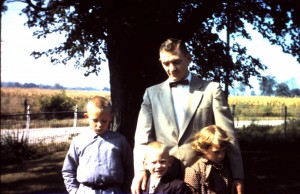 It happens to all of us, the death of Mom and Dad. I suppose it doesn’t always have to be specifically them, just whomever has filled the vital role of parent. I won’t get into the thicket of that issue as we see it in 2015. Suffice for now, my only concern is parent death.
It happens to all of us, the death of Mom and Dad. I suppose it doesn’t always have to be specifically them, just whomever has filled the vital role of parent. I won’t get into the thicket of that issue as we see it in 2015. Suffice for now, my only concern is parent death.
I’ve lost both my mother and father. It was back in my forties. Dad went first, Mom after another six years. In my own family now, my wife just lost her dad a couple months past. Her mother is still alive.
That’s why I’m writing down a few thoughts for you.
My first thought is a question. I could ask you a legion of them. Has it happened to you? How was it at the time? How has it evolved or changed over time (it will, inevitably, in my view)? If both parents are gone, what did the gap between the first and second feel like? And if neither are gone yet, how do you expect you’ll live it out?
You don’t have to answer. These are just some of what I’d ask if we were sipping coffee, wine, or whatever.
My next thought is that it never goes away. Indeed, the existence of this blog post—coming as I said after the death of my father-in-law—is testimony to that fact. His death harkened up all the memories that continue in the death of my own parents. It will be that way for my wife, too.
The cliche is that death is part of life. The reality is that not only is death part of life but life is part of death. You continue living and the memory of parent death lives with you. It is part of you.
I’d suggest that a person not try to fight it (the presence of death, that is). Don’t pretend otherwise, that you can trick or cheat death by shoving it aside while you move on. It will join you no matter how fast you try to go. That’s OK. Instead, I’d advise you to work on turning the persistence of parent death into a positive. It can be done. Make into your own word as I’ll do right now: parent-death.
I write and talk and think a lot about the past, as you well know. It seems to me that parent-death’s constant presence shows the power of the past. I’m not telling you that you should dwell in the past or let the past dwell in you to the point of dominance and limitation, I’m simply stating that the power of the past is a tangible thing. You probably wouldn’t think that based on your dislike of your high school or college history class. But don’t let that fool you. Parent-death demonstrates the power of the past.
A third thought is surprise. You’ll be surprised at something about your parent who has just died. The surprise could even be rather significant. Whether it’s in sorting through belongings, artifacts, memorabilia, or something else, you’ll almost invariably discover an unknown aspect of Mom or Dad. And I’m referring to basic, never-before-known discovery, not to modifying something you already knew. Those smaller modifications will number in the hundreds. But a fundamental addition to your knowledge of Mom or Dad will arise, too.
Lastly, the relationships that join you with others will be affected. Siblings, friends, extended family, strangers, whatever the case, the relations you have with them will act as they do in normal life—like tendons or the strands of a web. But with parent-death, my experience is that these relations will stretch and either strengthen or weaken. They won’t stay the same and snap back to an original, unchanged position as if nothing had happened. The stress of this unique event will find and hold those points where the greatest strength and the greatest weakness exist in relationships.
Before leaving you today, I’d be remiss if I didn’t reference my River construct. (If you don’t know what it is, look at The River on the top of the page). Parent-death is an example of both a Bend and a Stretch in the River. The Bend comes with a change in direction—I had Mom or Dad before and I will never have them in bodily form on earth again. The Bend takes you into a different direction and it’s not clear whether it’s going to be defined for a long period or not—whether it’s a Stretch or not. If you were close to your parent, the odds are that a Stretch will ensue after the Bend. If you weren’t close, something else ahead will make this part of the River into a Stretch. Going back to the odds for a moment, I’d wonder if despite a distant connection to your parent, parent-death will still work an effect on you in your relations to any children you have now or will have in the future (Down River). As I said earlier, parent-death is there with you no matter what.
You and I could talk about this for the rest of the day. Parent-death is one of life’s most meaningful events. For now, though, I thank you for taking a few minutes to ponder its place in Your River.







